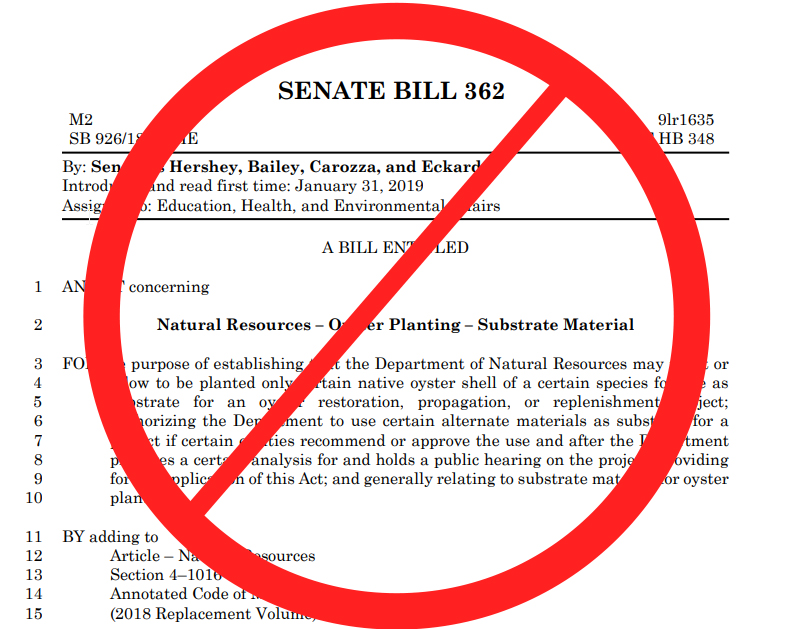How is it that with a mere one to two percent of historic oyster populations left, our leaders could attempt to make oyster replenishment harder and less effective? Yet that’s exactly what Maryland Senate Bill 362 (read the text here), introduced January 31, seeks to do. We need to speak up people, loud and clear at this very moment, to let our representatives know we won’t stand for this sort of utter nonsense.

What Senate Bill 362 Says
This bill, sponsored by Senators Stephen Hershey (district 36), John Bailey (district 29), Mary Beth Carozza (district 38), and Adelaide Eckardt (district 37), states that the DNR “may plant or allow to be planted only certain native oyster shell of a certain species for use as substrate for an oyster restoration, propagation, or replenishment project;” it then goes on to place a number of restrictions and requirements on the use of anything else. Naturally, it also specifies that fossilized native shell may be used without those restrictions. Not that we’ve heard anything before about a little place in the Upper Bay called Man ‘O War Shoal, right?
One might ask, why in the heck would any legislator who truly cares one iota about the health of the Chesapeake make it harder to replenish oysters? Especially when, according to NOAA, stone reef built in Harris Creek has been shown to support 400 percent more oysters than shell reef? (Read more about this in 10 Billion Oysters). Doesn’t that make it obvious that we should be looking to these far better performing substrates for oyster restoration?
Of course it does. But there’s one little “problem” with oyster grown on concrete, rock, and rubble: it’s very difficult or impossible to harvest commercially.
What does all this boil down to? Certain commercial interests – not all of them, there are plenty of responsible-minded watermen out there – are willing to sacrifice one of the best oyster restoration tools we’ve found yet in order to harness more of the state’s funds, so it uses a far less effective but still-harvestable restoration method. Worse yet, there are politicians out there who are perfectly willing to aid them in that endeavor by putting forth odious bills like SB 362.
And all this takes place with one to two percent of the historic oyster population left. It’s utterly irresponsible. It’s sickening. And it’s dang well about time we let our politicians know that in the eyes of we citizens who actually give a damn about the Bay, this is a firing offense. It’s time for those of you who are represented by these politicians to send an email, polite but spirited, letting them know how you feel about bills like this and how it will affect your future votes. We’d suggest letting these four in particular know that you may be willing to give them a second chance in the future, but not if they continue to support this bill nor if they put forth similarly unconscionable garbage in the future. And it’s time for everyone living in other districts to preempt the possible passage of this bill by sending your senator an email letting them know how you feel about it.
Names, districts, counties, and contacts for all of your legislators can be found on the General Assembly web page.
To make life easy for those of you living in the districts of those four who introduced SB 362, here are their email addresses:
Stephen Hershey: steve.hershey@senate.state.md.us
John (Jack) Baily: jack.bailey@senate.state.md.us
Mary Beth Carozza: marybeth.carozza@senate.state.md.us
Adelaide Eckardt: adelaide.eckardt@senate.state.md.us
Remember people, keep it polite – but let your feelings be known. Please also consider dropping Governor Hogan a line and let him know how you feel about the issue. Remember that less than two years ago he supported opening a large portion of Maryland’s protected oyster sanctuaries, but was forced to hold off when the legislature passed a bill requiring a full assessment of the population. That assessment is in, and it puts the current population at 300 million oysters – half of what it was just one decade ago. Yet still, you can bet that some people will try to argue for expanding the harvest. Yet still, the oysters are under assault.
It’s long past time to stop this madness.